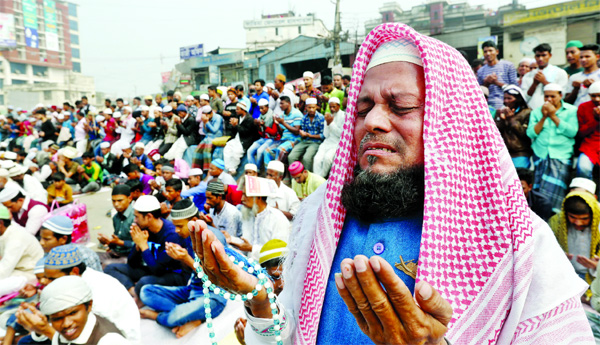
Tens of thousands of Muslim devotees, including 2500 foreigners from 35 countries, prayed for Divine blessings for the Muslim Ummah during the Akheri Munajat (final prayers) of the last phase of three-day Biswa Ijtema on Turag River banks on Sunday morning,
Maulana Muhammad Jamshed, an Indian scholar, conducted the 17-minute munajat amid heightened security measures seeking Divine blessings for Muslims across the world.
Earlier Maulana Iqbal Hafiz and Maulana Wasiful Islam delivered a
sermon on the importance of Islam based on the Holy Quran and the Hadith. The Muslim devotees thronged the Ijtema ground under the open sky with more than 2,500 foreign devotees from 35 countries, including Jordan, Libya, Lebanon, Afghanistan, Palestine, the USA, Turkey, Iraq, Saudi Arabia, India, Pakistan and UK from the first day of the second phase.
However, the presence of people was less than the first phase, law enforcing agencies sources said.
Meanwhile, five more Muslim devotees died during at the second phase of the Biswa Ijtema while 13 in the first phase, said Md Manjur Rahman, Deputy Commissioner of Gazipur Metropolitan Police (GMP).
Bangladesh Railway (BR) arranged special trains for easy transportation of devotees on the occasion of the first and second phases of 55th Biswa Ijtema, he mentioned.
Earlier, the first phase of the Ijtema was held on January 10 to 12 at the same venue.
Supporters of Maulana Zubair joined the first phase of Ijtema while the second phase with the disciples of Maulana Mohammed Saad Kandhalvi, a Delhi-based member of the Tabligh Jamaat Supreme Council.
Tablig Jamaat has been organizing the Biswa Ijtema on the bank of Turag River since 1967. Now, Ijtema is being held in two phases since 2011 to ease the accommodation problem.

